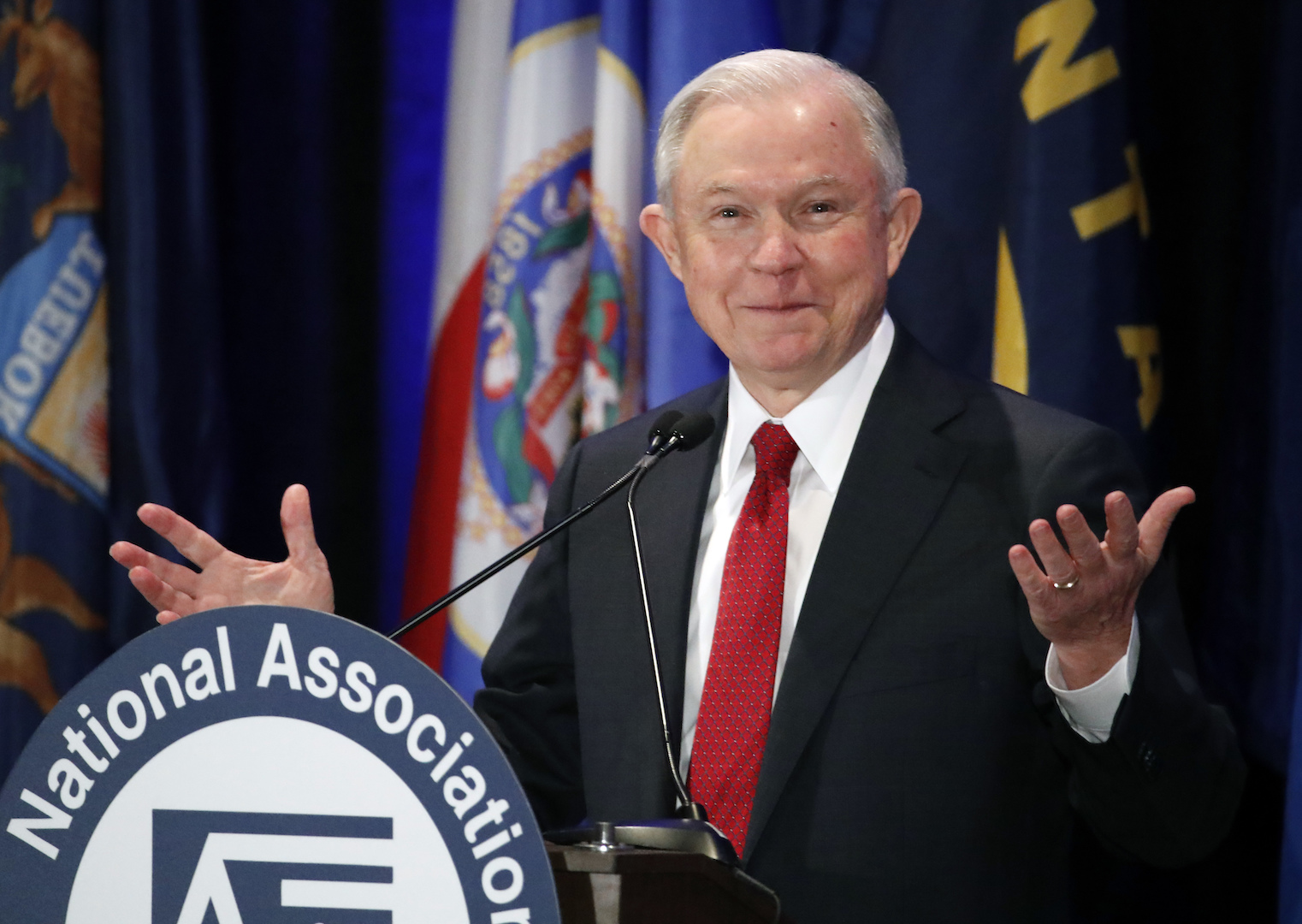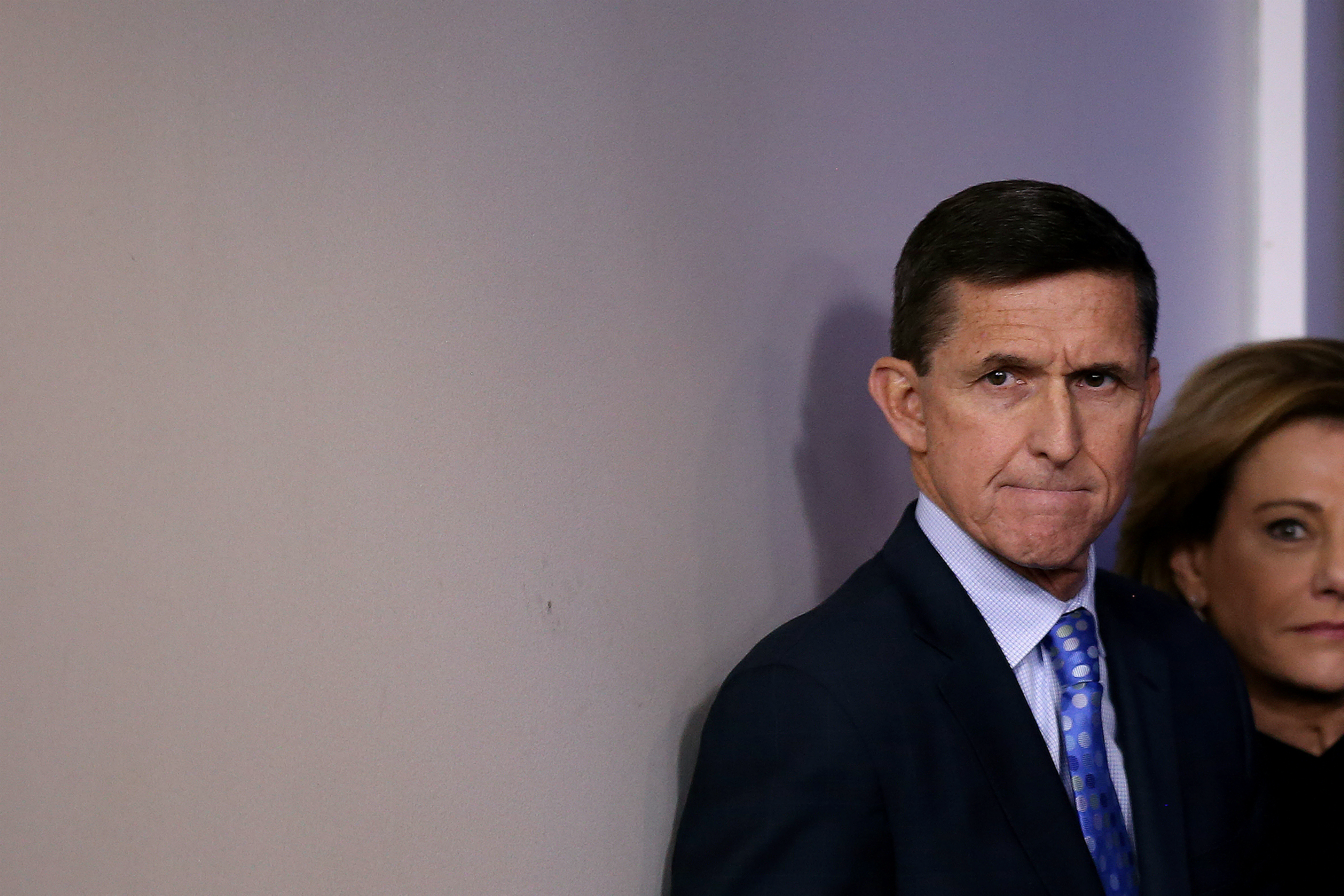It’s the controversy the White House can’t shake. Since pulling off a surprise election win in November, Donald Trump has been dogged by persistent reports linking his campaign surrogates and staff to Russia. But what’s more unusual are the attempts by Trump’s campaign and administration to hide the links, even as the U.S. intel community says Moscow actively meddled in the U.S. election to Trump’s benefit.The Washington Post Wednesday revealed that then–Sen. Jeff Sessions twice met with Russian ambassador to the United States Sergey Kislyak in the run-up to the November elections, meetings he later failed to disclose during his Senate confirmation hearing to become attorney general.The new revelations reignited calls for an independent investigation into Russia’s alleged interference in the 2016 election. Meanwhile, Trump and his allies continue to deny any wrongdoing — issuing at least 20 denials thus far. On Thursday Trump said the latest Russia-related reports amounted to a “total witch hunt.”But taken in sum, the number of Trump associates with connections to Russia, and particularly Ambassador Kislyak, is pretty striking. Here’s a running list so far: The attorney general is the latest high-ranking official in Trump’s circle to find himself embroiled in the scandal. Sessions, during his Senate confirmation hearing in January, failed to disclose two meetings with Russian Ambassador Sergey Kislyak that took place during last year’s election campaign, when he was advising Trump. Sessions says the meetings were taken in his capacity as a senator but financial records uncovered by the Wall Street Journal and ABC News show he used campaign funds rather than official Senate Armed Services Committee funds for his visit with Kislyak.Sessions announced Thursday he will recuse himself from any potential investigation into the links between Trump and Russia, but he made clear he has no intention of resigning from his post. Trump has stood by his AG, calling him “an honest man.”
The attorney general is the latest high-ranking official in Trump’s circle to find himself embroiled in the scandal. Sessions, during his Senate confirmation hearing in January, failed to disclose two meetings with Russian Ambassador Sergey Kislyak that took place during last year’s election campaign, when he was advising Trump. Sessions says the meetings were taken in his capacity as a senator but financial records uncovered by the Wall Street Journal and ABC News show he used campaign funds rather than official Senate Armed Services Committee funds for his visit with Kislyak.Sessions announced Thursday he will recuse himself from any potential investigation into the links between Trump and Russia, but he made clear he has no intention of resigning from his post. Trump has stood by his AG, calling him “an honest man.” A retired Army lieutenant general and an early Trump campaign surrogate, Flynn was national security adviser in Trump’s administration for less than a month. Flynn found himself in hot water after it was revealed he spoke to Russia’s Kislyak about sanctions before taking office, a fact he denied on multiple occasions, misleading Vice President Pence and the American people along the way.Flynn resigned his post on Feb. 13 — just 24 days after taking the job.The president’s son-in-law and senior adviser joined Flynn in an undisclosed meeting he held with Kislyak at Trump Tower in the run-up to Inauguration Day, according to the New York Times. Though the Times reports that Flynn was the driving force behind the conversation with Kislyak, Kushner’s presence in the meeting is notable, given his close relationship with the president.Trump’s former campaign manager and a veteran Republican political strategist, Manafort has a history of business links in Russia and the Ukraine. Last August he was named in an investigation by Ukrainian authorities looking into the $12.7 million he received between 2007 and 2012 from Ukraine’s pro-Russian former president, Viktor Yanukovych.He has also been included in the FBI’s ongoing investigation into communications between Trump associates and Russian intelligence agencies. Manafort denies having had any communication with the Kremlin. “I have never knowingly spoken to Russian intelligence officers. It’s not like these people wear badges that say, ‘I’m a Russian intelligence officer.’”Manafort left Trump’s campaign in August under a cloud of controversy.A low-level adviser once linked to Trump’s campaign, Page is facing renewed scrutiny for his links to the Kremlin after it was revealed Thursday that he too met with Kislyak, on the sidelines of the Republican National Convention last year. Page admitted the meeting took place, but added: “I will say that I never met him anywhere outside of Cleveland; let’s just say that much.”Like Page, Gordon was another of Trump’s lower-level campaign advisers. Serving as national security policy representative for the Republican National Convention, Gordon was in the meeting with Page and Kislyak. He has changed his account of what happened at the GOP national security subcommittee meeting in Cleveland last July.The longtime Republican operative, noted conspiracy theorist, and Trump adviser was accused by Democrats of being a “conduit between the Russian hackers and WikiLeaks,” helping the latter publish emails leaked from the account of John Podesta, Hillary Clinton’s campaign manager.Stone remains part of the FBI investigation, but he has denied any wrongdoing, calling the accusations “the new McCarthyism.”Trump’s longtime lawyer Michael Cohen was accused last month of hand-delivering a “peace plan for Russia and Ukraine” to then-national security adviser Michael Flynn, which included the lifting of sanctions against the Kremlin. The New York Times reported that Cohen, along with Russian-born American real estate developer Felix Sater and Ukrainian lawmaker Andrii Artemenko, were the driving forces behind the plan.Cohen admitted to meeting with Sater and Artemenko to discuss the proposal but “emphatically” denied “discussing this topic or delivering any documents to the White House and/or General Flynn.” Cohen was also named in the explosive and unsubstantiated dossier leaked in January.Habibah Abass contributed reporting.
A retired Army lieutenant general and an early Trump campaign surrogate, Flynn was national security adviser in Trump’s administration for less than a month. Flynn found himself in hot water after it was revealed he spoke to Russia’s Kislyak about sanctions before taking office, a fact he denied on multiple occasions, misleading Vice President Pence and the American people along the way.Flynn resigned his post on Feb. 13 — just 24 days after taking the job.The president’s son-in-law and senior adviser joined Flynn in an undisclosed meeting he held with Kislyak at Trump Tower in the run-up to Inauguration Day, according to the New York Times. Though the Times reports that Flynn was the driving force behind the conversation with Kislyak, Kushner’s presence in the meeting is notable, given his close relationship with the president.Trump’s former campaign manager and a veteran Republican political strategist, Manafort has a history of business links in Russia and the Ukraine. Last August he was named in an investigation by Ukrainian authorities looking into the $12.7 million he received between 2007 and 2012 from Ukraine’s pro-Russian former president, Viktor Yanukovych.He has also been included in the FBI’s ongoing investigation into communications between Trump associates and Russian intelligence agencies. Manafort denies having had any communication with the Kremlin. “I have never knowingly spoken to Russian intelligence officers. It’s not like these people wear badges that say, ‘I’m a Russian intelligence officer.’”Manafort left Trump’s campaign in August under a cloud of controversy.A low-level adviser once linked to Trump’s campaign, Page is facing renewed scrutiny for his links to the Kremlin after it was revealed Thursday that he too met with Kislyak, on the sidelines of the Republican National Convention last year. Page admitted the meeting took place, but added: “I will say that I never met him anywhere outside of Cleveland; let’s just say that much.”Like Page, Gordon was another of Trump’s lower-level campaign advisers. Serving as national security policy representative for the Republican National Convention, Gordon was in the meeting with Page and Kislyak. He has changed his account of what happened at the GOP national security subcommittee meeting in Cleveland last July.The longtime Republican operative, noted conspiracy theorist, and Trump adviser was accused by Democrats of being a “conduit between the Russian hackers and WikiLeaks,” helping the latter publish emails leaked from the account of John Podesta, Hillary Clinton’s campaign manager.Stone remains part of the FBI investigation, but he has denied any wrongdoing, calling the accusations “the new McCarthyism.”Trump’s longtime lawyer Michael Cohen was accused last month of hand-delivering a “peace plan for Russia and Ukraine” to then-national security adviser Michael Flynn, which included the lifting of sanctions against the Kremlin. The New York Times reported that Cohen, along with Russian-born American real estate developer Felix Sater and Ukrainian lawmaker Andrii Artemenko, were the driving forces behind the plan.Cohen admitted to meeting with Sater and Artemenko to discuss the proposal but “emphatically” denied “discussing this topic or delivering any documents to the White House and/or General Flynn.” Cohen was also named in the explosive and unsubstantiated dossier leaked in January.Habibah Abass contributed reporting.
Advertisement
Jeff Sessions

Advertisement
Michael Flynn

Jared Kushner
Paul Manafort
Advertisement
Carter Page
Page was named in a New York Times report in January among people being investigated by law enforcement and intelligence agencies over possible links between Russian officials and Trump associates. Page calls the allegations “baseless and purely partisan.”In September, the Trump campaign attempted to distance itself from Page altogether, with Kellyanne Conway saying, “He’s certainly not part of the campaign that I’m running.”
J.D. Gordon
After initially saying he stayed out of the Russia-Ukraine issue, on Thursday he admitted to advocating against the U.S. arming Ukrainian soldiers in their fight against Russian-backed separatists, a position that, he said, was “in line with Trump’s views” on the issue.
Advertisement
